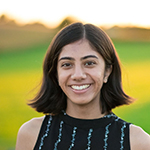As a senior at Duke University in 2010, Dr. Quinn Wang was simply Quinn, an undergraduate English major on the pre-med track, wondering how to combine her love for medicine with her love for English. This is how her senior thesis was conceived – Through the Lens of Medicine: Landscapes of Violence in Cormac McCarthy’s Blood Meridian (1985), All the Pretty Horses (1992), and No Country for Old Men (2005) – which ended up winning the English department’s award for “Most Original Honors Thesis.”

Fast forward 12 years, and Wang can now call herself a double Dukie, having completed medical school here. She went on to complete ophthalmology residency at UCSF and this past Saturday, November 5, came back to her alma mater as part of the Duke Medical Ethics Journal’s Medicine, Humanities, and Business celebration to talk to an eager audience at Schiciano Auditorium about her path from Duke until now.

She began her story during the infamous year of 2020, when she was forced to stop seeing patients at her private practice in California’s Bay Area due to COVID-19. Restless and anxious about how her patients were doing, she tried to keep up with them as best she could, but of course there were limitations. And then, a few months in, one of her patients went blind.
This tragic moment sparked a frustrating realization by Wang that in the tech capital of the world – San Francisco – there was still no good way to test people’s eyesight from home to prevent what should have been preventable. She decided to put together something herself, guided by the one question she thought was most important to answer until COVID-19 abated and people could come into clinics again – “how do we make sure people don’t go blind?”
Wang took common visual eye-testing tools used in clinics, and with some simple Photoshop editing and a little bit of code, turned them into a series of easy multiple-choice questions that could be answered from home. This simple but powerful transformation turned into Quadrant Eye, a start-up she co-founded with software engineer Kristine Hara.

The Quadrant Eye journey has taken her from running a private practice as an ophthalmologist to taking the plunge into business by applying to and getting selected for Y Combinator, which calls itself a “graduate school for startups”. YC invests $500,000 into a selection of early-stage startups twice a year. Then, for three intense months, they provide support to get startups off the ground and in good shape to present to investors for funding. At YC, Hara worked on turning Quadrant Eye into an app, and Wang renewed hundreds of prescriptions.

Ultimately, though, the most significant place Quadrant Eye has led Wang to is a journey of self-mastery that applies to any human endeavor, from building a startup to doing research to just getting up every morning. As she describes, startup life entails always learning new things and always messing up – which, for someone who professes that “I don’t like to do things I’m not good at” – can be challenging. She candidly admitted that she, like everyone, has bad days, when sometimes all she can do is throw in the towel and end work early. “I have more doubts than I care to admit,” Wang says, but at the end of the day, “we’re all climbing our own mountains”. Pushing through requires “superhuman effort” but it’s worth it.
And as for that English thesis? Wang describes how Quadrant Eye’s very first investor – “let’s call him Charlie” – asked her all the requisite questions investors ask early-stage startups (think Shark Tank). But he also asked her for something non-traditional – all fifty or so pages of her undergraduate honors thesis she had written ten years back. Apparently, he had seen a mention of it on LinkedIn and was intrigued. A few weeks later, Wang received a phone call that he was interested in investing – and he admitted that her thesis had played a part. To him, the uniqueness and quality of her thesis showed that Wang could problem-solve, communicate well, and think creatively, and Wang herself agrees. “My English thesis showed me that I can do hard things,” she said, and if Quadrant Eye is any indication, clearly, she can.

Post by Meghna Datta, Class of 2023
